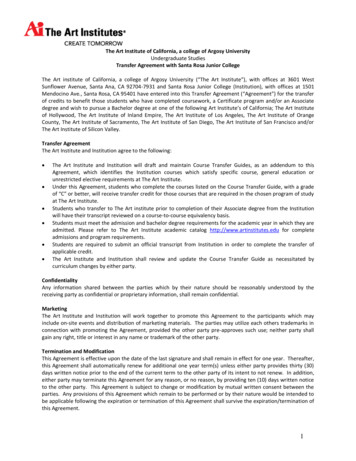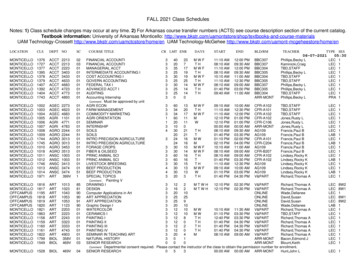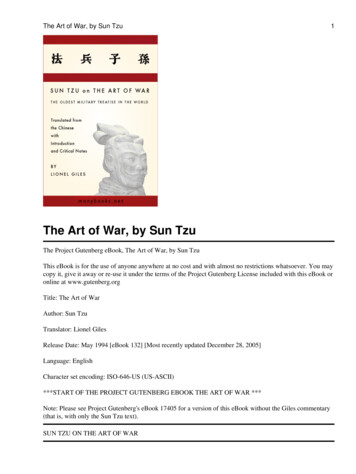
Transcription
“THE ART OF SERVING IS WITH THEM INNATE”: HUNTING, FISHING, ANDINDEPENDENCE IN THE POST-EMANCIPATION SOUTH, 1865-1920byScott Edward GiltnerBA, Hiram College, 1996MA, University of Pittsburgh, 1998Submitted to the Graduate Faculty ofArts and Sciences in partial fulfillmentof the requirements for the degree ofDoctor of PhilosophyUniversity of Pittsburgh2005
UNIVERSITY OF PITTSBURGHFACULTY OF ARTS AND SCIENCESThis dissertation was presentedbyScott Edward GiltnerIt was defended onJune 29, 2005and approved byDr. Kathleen Blee, SociologyDr. Seymour Drescher, HistoryDr. Marcus Rediker, HistoryDr. Van Beck Hall, HistoryDissertation Directorii
CopyrightByScott Edward Giltner2005iii
“THE ART OF SERVING IS WITH THEM INNATE”: HUNTING, FISHING, ANDINDEPENDENCE IN THE POST-EMANCIPATION SOUTH, 1865-1920Scott Edward Giltner, PhDUniversity of Pittsburgh, 2005AbstractThis dissertation argues that hunting and fishing became central battlegrounds in thestruggle over African-American independence between the end of the Civil War and the 1920s.Throughout that period, those deeply-rooted black cultural traditions, carried through centuriesof bondage and further developed after 1865, remained important weapons in AfricanAmericans’ fight to control their own lives and labor. Drawing on narratives of former slaves,sportsmen’s recollections, records of fish and game clubs and resorts and sporting periodicals, Ishow that former slaves used hunting and fishing to reduce their dependence on agriculturallabor in the service of whites and maximize their freedom. Because they reflected both symbolicand real African-American independence, hunting and fishing became central targets of whiteefforts to more firmly draw the racial line and protect their own economic and sporting interests.My project contributes to Southern and African-American historiography by illuminatingthe overlooked connection between hunting and fishing and the evolution of the Southern racialdivide. I show that African Americans’ right to hunt and fish became real and perceived sourcesof labor intractability, establish the importance of African Americans to a Southern sportingtourism industry dependent upon the physical and symbolic presence of subordinated formerslaves, and expose fear of black independence as an overlooked motive in the rise of theiv
Southern conservation movement. I thus broaden our understanding of late nineteenth and earlytwentieth century Southern life by showing how African Americans cultivated long-cherishedsurvival mechanisms to meet the changing conditions of freedom. In doing so I clarify how acoalition of whites worked to circumscribe black subsistence for their own ends and illustratehow hunting and fishing played a key role in both processes.v
TABLE OF CONTENTSAcknowledgements. xPrologue: Hunting, Fishing, and Freedom. xiiiThe Problem of African-American Liberation . xviiiDissertation Structure. xxii1. Chapter One: “Idle Time Not Idly Spent”: African-American Hunting and Fishing in thePost-Emancipation South. 1Introduction. 1Hunting and Fishing & African-American Subsistence . 5Means, Methods and Social Tensions. 17Employment & Marketing . 30Conclusion . 472. “You Can’t Starve a Negro”: Hunting and Fishing and the Problem of IndependentSubsistence in the Post-Emancipation South. 50Introduction. 50Freedom and the Problem of Subsistence. 55Hunting and Fishing and Black Subsistence. 63Hunting, Fishing & the “Labor Question”. 73Conclusion . 903. “The Pot Hunting Son of Ham”: White Sportsmen’s Objections to African-AmericanHunting and Fishing. 93Introduction. 93The Context of Postwar Southern Hunting and Fishing . 96African Americans & the White Sporting Ideal . 101Criticism of African-American Sporting Habits. 117From Sporting Inferiority to Racial Inferiority. 130Conclusion . 1444. “The Art of Serving is With Them Innate”: African Americans and the Work of SouthernHunting and Fishing. 146Introduction. 146African-American Sporting Labor. 153The Benefits of Sporting Labor, Part I. 176The Benefits of Sporting Labor, Part II . 1865. “With the Due Subordination of Master and Servant Preserved”: Race and SportingTourism in the Post-Emancipation South . 199Introduction. 199Southern Sporting Tourism. 208Nostalgia, Race, & Sporting Tourism. 225African Americans and Sporting Resorts/Plantations. 234Conclusion . 2456. “When He Should Be Between the Plow Handles”: Sportsmen, Landowners, Legislatures,and the Assault on African-American Hunting and Fishing. 251Introduction. 251vi
Resistance to Southern Fish and Game Regulation . 256African Americans and Fish and Game Laws . 269Epilogue: Contradiction and Continuity in the Southern Sporting Field. 301APPENDIX A. 313Note on Sources . 313BIBLIOGRAPHY. 319Abbreviations Used. 319Primary Sources . 319Secondary Sources . 331vii
LIST OF TABLESTable 1: 1910 African American Population, By Percentage, of 16 of the 17 South CarolinaCounties Covered by the 1914 Ziegler Bill . 316viii
LIST OF FIGURESFigure 1: How Old Sport Stopped the Game Hog’s Little Game. . 183Figure 2: National African American Population Concentration in 1910 . 315ix
AcknowledgementsWriting a dissertation can be a daunting and isolating experience at times and, for thatreason, can never be truly an individual endeavor. This project could not have been completedwithout the intellectual, emotional, and moral support of many fine people. Thus my deepestappreciation and gratitude goes to my family, friends, and colleagues for their help, guidance,and patience through this challenging and sometimes difficult process.My thanks go out to the members of my committee, past and present, for their effortsreading, criticizing, and sharpening my work over the years. Without welcome advice and keeninsight from Professors Paula Baker, Kathleen Blee, Seymour Drescher, John Markoff, andMarcus Rediker, this project would not have been possible. My dissertation and my ownunderstanding of history are much stronger for their efforts and I sincerely thank them for theirinterest and guidance.I especially wish to express my sincere appreciation for the unbending support of myvalued advisor, Professor Van Beck Hall. Dr. Hall’s mentoring over the long years, from ourexplorations of Southern history in early independent studies (during which he first displayed histerrifying but inspirational knowledge of the region) to the final stages of dissertation writing,showed me what it truly means to be a dedicated scholar, thoughtful educator, and concernedadvisor and friend. I intend to follow his fine example as best I can in my own career.In addition to my committee, I have also been fortunate to share the wisdom andguidance of other distinguished professors at the University of Pittsburgh. I wish to thankWilliam Chase, Maurine Greenwald, Bernard Hagerty, the late Michael Jimenez, RichardOestreicher, Evelyn Rawski, and Rob Ruck. These individuals provided needed advice andkindly support throughout my graudate career, and I am grateful for their efforts.x
Numerous organizations have provided generous financial support for my research andwriting. I was fortunate to receive the Samuel P. Hays Research Award from the historydepartment of the University of Pittsburgh in 2001 and 2004 which greatly aided in, first,locating and, later, completing the necessary research. In between those awards, I receivedvaluable support from the Virginia Historical Society in the form of an Andrew W. MellonResearch Fellowship that funded my work in Richmond. For my work in the Southern Historicaland North Carolina Collections at the University of North Carolina, I benefited from the ArchieK. Davis Research Fellowship from the North Caroliniana Society. In addition to the abovegrants and awards, most valuable assistance was provided by the Lillian B. Lawler PredoctoralFellowship which enabled me to complete the majority of my research. I sincerely thank eachorganization and the individuals involved for these much appreciated awards.I also wish to acknowledge the librarians and archivists at the sites I visited for theresearch. Their help and interest in my project made the research process much easier. I wish toespecially thank the staff of the Hillman Library at the University of Pittsburgh, particularly theInter-Library Loan and Microfilm departments, who were a great help for this project and mygraduate work in general. I also thank the staff of the Library of Virginia and Virginia HistoricalSociety in Richmond, the North Carolina State Archives in Raleigh, the South CarolinaHistorical Society in Charleston, the South Carolina State Archives and South CarolinianaLibrary in Columbia, and the Southern Historical and North Carolina Collections at theUniversity of North Carolina.The cheerful and ceaseless efforts of the history department staff at the University ofPittsburgh were absolutely critical to completing both the dissertation and the PhD. These arethe people who really make the history department go-the people without whom we graduatexi
students would have been lost in the tall grass. My deep appreciation to Graduate SecretariesGrace Tomcho and Molly Estes for their friendship, knowledge of University bureaucracy, andwillingness to listen to and help with all problems great and small. I also wish to thank the otherdepartment staff, past and present, whose efforts have meant so much over the years. My thanksgo to Kathy Gibson, Judy Macey, Faye Schneider, Anna Segreti, and Jialu Wu.I wish to make special mention of the friends and graduate student colleagues whosefriendship over the years have been so important to me personally and professionally. Withouttheir interest in my work, enthusiasm for reading all or parts of the dissertation, thoughtful andinsightful criticism, and steadfast intellectual and emotional support, this project would not havebeen started, let alone finished. In seminars, on the telephone, via e-mail, in the graduate studentlounge, and in many bars, the network of friends I joined while in Pittsburgh proved invaluable.I deeply thank Tania Boster, John Donoghue, Mike Ervin, Jeff Forret, Andrew Haley, JackKapluck, Mike McCoy, Craig Marin, Dave Recht, Chad Statler, Vanessa Sterling, and EllieWalsh for their steadfast friendship and valuable contributions to my work.Finally, I wish to acknowledge the love and support from my family that made mygraduate studies possible in the first place. Without the tireless and unwavering emotional (andfinancial!) support from my parents, John and Judy Giltner, I could never have reached thispoint. I thank them for their patience during this long process and for their faith that it wouldsomeday reach a conclusion. Ultimately, the existence of this dissertation is probably bettertestament to their hard work and dedication than to mine.xii
Prologue: Hunting, Fishing, and FreedomThis dissertation began as a proposal for a master’s thesis on hunting and fishing inplantation slave communities. The logical starting point for such a project was the collection offormer slave narratives compiled by George Rawick in the 1950s and 60s. A cursoryexamination of various state narratives revealed that many former slaves enthusiastically recalledmoments stalking through the woods or quietly fishing at a nearby creek and that that suchactivities stood out as rare high points in a cold and capricious system based on brutalexploitation. Their descriptions, moreover, indicated that hunting and fishing as sport orrecreation was at best a secondary consideration for slaves. Hunting and fishing served a morevital function. When former slaves described the primary benefits of hunting and fishing, theyrecalled not only recreation, but, more significantly, the crucial ability to feed themselves whensufficient food was denied them, the feelings of pride that came with providing for one’s self andfamily within a system that sought to keep slaves in a state of dependency and the valuablemarket activities, both simple and elaborate, that provided bond people and their families withmuch-needed cash and goods. Much more than fun or sport attended such abilities. As CharlesBall remembered of the day he acquired an old musket for hunting, “I now began to live well,and to feel myself, in some measure, an independent man.”1The hundreds of former and runaway slave narratives indicated that hunting and fishinggave bond people greater control of their time and cultivated independence rather than mere1Ball, Charles, Slavery in the United States: A Narrative of the Life and Adventures of Charles Ball, a BlackMan, Who Lived Forty Years in Maryland, South Carolina and Georgia, as a Slave Under Various Masters, andwas One Year in the Navy with Commodore Barney, During the Late War, (New York: John S. Taylor, 1837),352.xiii
recreation, a theme which ultimately formed the heart of my master’s thesis.2 This work, basedmostly on former slave narratives and elite, white accounts of plantation life, argued that suchactivities strengthened slaves’ nutritional and material condition, provided food, money andmaterial goods, and gave slaves time for family and community camaraderie. Hunting andfishing created and augmented feelings of independence among slaves and turned privilegesmasters granted into customary rights slaves expected. Once such privileges became established,slaves regarded them as part of a contract—informal, of course, yet important and worthdefending. Moreover, just as some masters used hunting and fishing to solidify their hold onlabor, slaves used it to make claims to their own time and cultivate opportunities to resist, subtlyand overtly, the conditions of bondage. The thesis explained some of the ways slaves relied onthe natural environment to ease the daily burdens of bondage, identified hunting and fishing ascontested activities inseparably linked to the Southern racial divide, and raised importantquestions about the connection between hunting and fishing and race after Emancipation.Despite the frequency with which hunting and fishing appeared in narratives of black lifebefore and after slavery, those activities have received almost no attention from scholars ofSouthern or African-American history.3 With the exception of a few works on slavery andSouthern culture, scholars have largely ignored black customary rights and their impact on2Scott E. Giltner, “’Whatever I Could Git’: Slave Hunting and Fishing in the Plantation South,” University ofPittsburgh MA Thesis, 1998. The thesis has since been published as “Subsistence and Subversion: Slave Huntingand Fishing in the Antebellum South,” in “To Love the Wind and the Rain”: Essays in African AmericanEnvironmental History, eds., Dianne Glave and Mark Stoll (University of Pittsburgh Press, Fall 2005).3This lack of scholarship is true of United States historians in general. With but few exceptions, Americanhistorians have lagged far behind their European, especially British, counterparts in using customary rights such ashunting and fishing as important lenses in rural and plebian history. See, for example, Douglas Hay’s “Poachingand the Game Laws of Cannock Chase,” in Hay, et al. Albion’s Fatal Tree: Crime and Society in EighteenthCentury England, (New York: Pantheon Books, 1975); Roger B. Manning’s Hunters and Poachers: A Social andCultural History of Unlawful Hunting in England, 1485-1640, (New York: Oxford University Press, 1993); and E.P.Thompson’s Whigs and Hunters: The Origins of the Black Act, (New York: Pantheon Books, 1975).xiv
Southern society.4 Most studies of hunting and fishing in the United States between theeighteenth and twentieth centuries have focused on such topics as how elites used field sports toreinforce class distinctions; the ways hunting and fishing reinforced or redefined Americanmasculinity; and how such activities fit into the ebb and flow of American evangelicalism.5 Thefew extant studies of Southern hunting and fishing fit this pattern, giving little more than passingnotice to the ways that those activities reflected larger and longer-lasting racial conflict.6 Asidefrom Nicholas Proctor’s study of hunting in the antebellum South, few scholars have addressedthe importance of hunting and fishing to white and black Southerners or have placed those4The few works that discuss these topics either do so briefly, such as the classic plantation studies by GeorgeRawick (From Sunup to Sundown: The Making of the Black Community, Westport, CT: Greenwood Publishing,1972), Eugene Genovese (Roll, Jordan, Roll: The World the Slaves Made, New York: Vintage Books, 1974), andJohn Blassingame (The Slave Community: Plantation Life in the Antebellum South, New York: Oxford UniversityPress, 1972), or do so in short articles which do not have hunting and fishing as a central focus, such as JohnCampbell’s “’My Constant Companion’: Slaves and their Dogs in the Antebellum South” in Larry E. Hudson Jr., ed.Working Toward Freedom: Slave Society and Domestic Economy in the American South, (Rochester, NY:University of Rochester Press, 1994) and David K. Wiggins’ “Good Times on the Old Plantation: PopularRecreations of the Black Slave in Antebellum South, 1810-1860.” Journal of Sports History Volume 4 (1), (1977),260-284. The most important exception to this lack of attention is Nicholas W. Proctor’s fine Bathed in Blood:Hunting and Mastery in the Old South, (Charlottesville: University of Virginia Press, 2002). Aside from theseworks, which do not address the post-Emancipation period, few works address the role hunting and fishing played inthe lives of Southern African Americans through the nineteenth century and beyond.5For a discussion of hunting and fishing and class see Gary Kulik’s “Dams, Fish and Farmers: Defense of PublicRights in Eighteenth Century Rhode Island,” in Steven Hahn and Johnathan Prude, eds., The Countryside in the Ageof Capitalist Transformation: Essays in the Social History of Rural America, (Chapel Hill: University of NorthCarolina Press, 1985); and Harry L. Watson’s “’The Common Rights of Mankind’: Subsistence, Shad andCommerce in the Early Republican South,” (Journal of American History 83 (1996): 13-43. For work that placessuch topics in the context of masculinity and nationalism, see Daniel Justin Herman’s Hunting and the AmericanImagination, (Washington, DC: Smithsonian Institution Press, 2001). For analysis addressing hunting in terms ofclass, masculinity and religion, see Ted Ownby’s Subduing Satan: Religion, Recreation and Manhood in the RuralSouth 1865-1920, (Chapel Hill: University of North Carolina Press, 1990).6There are several exceptions to this general trend. Steven Hahn’s “Hunting, Fishing and Foraging: CommonRights and Class Relations in the Postbellum South,” demonstrates that Southern elite’s loss of control over thelower classes, especially African Americans, proved an incentive for restricting the general right to hunt, fish, forageand graze beginning in the 1870s. Radical History Review 26 (October 1982): 36-64. Another exception is Stuart A.Marks, Southern Hunting in Black and White: Nature, History and Rituals in a Carolina Community, (Princeton,NJ: Princeton University Press, 1991), which briefly discusses how hunting helped elites establish their identities inopposition to African Americans. Finally, Jacob F. Rivers’ literary analysis of Southern hunting and fishingnarratives, Cultural Values in the Southern Sporting Narrative, (Columbia: University of South Carolina Press,2002), briefly notes the ways sporting narratives reveal white elites’ attempts to reinforce their cultural authority.Hahn, Marks and Rivers argue a general connection between hunting and fishing and race, but none gives the topicdetailed analysis.xv
activities within the context of the Southern racial divide. However, when the larger economicand cultural meaning of African American hunting and fishing in the nineteenth century is morefully explored, we can learn much more about race in the antebellum and postwar South.7 Byclearly establishing the impact of hunting and fishing on African Americans’ lives—throughacquiring food and money, creating physical and psychological distance between black andwhite, even advancing opportunities to resist economic exploitation and white supremacy—wecan view the region’s fields, forests and streams as contested arenas that reflect key tensions inSouthern life. This study suggests that examining nineteenth-century African Americans’ “largerlandscapes of subsistence,” to use historian Mart A. Stewart’s phrase, can reveal as much aboutrace and race relations as about class conflict, masculinity and American religiosity.8Steven Hahn’s work, a key exception to scholars’ tendency to ignore customary rights,also advances an argument central to this thesis. With his 1983 study The Roots of SouthernPopulism: Yeomen Farmers and the Transformation of the Georgia Upcountry, 1850-1890,Hahn created controversy with his assertion that an attack by landed elites and industry-mindedcapitalists on the customary rights of lower-class blacks and whites, including access to wastelands, open pasturage, foraging, and hunting and fishing, became a powerful trend of the postwarSouth. Rural and urban Southern elites, Hahn argued, saw such rights as antithetical to economicdevelopment. Plebeians in the Southern uplands, however, saw those traditions as part of a7Nicholas Proctor has compared the meaning of hunting by white slave owners with hunting by slaves to greateffect, clearly establishing hunting as an important way Southern elites defined and conserved both their classprivilege and racial identity. For elite white sportsmen, according to Proctor, the act of hunting an animal“dramatized the wide-ranging mastery of white patriarchy” while “participation in the hunt made them more thanmen, it made them a master class.” Bathed in Blood, 210.8Here Stewart specifically addressed the importance of swamp lands as a sort of “promised land” that AfricanAmericans could reclaim for their own economic and cultural betterment. But according to Stewart, the real andsymbolic importance of swamp land was in fact “a story about every place in the South where undrained andunclaimed land offered a refuge for African Americans.” ‘What Nature Suffers to Groe’: Life, Labor andLandscape On the Georgia Coast, 1680-1920, (Athens: University of Georgia Press, 1996), 245.xvi
loosely defined “cooperative commonwealth” which enabled them to use the spreading “free”market to their advantage and, for a time, resist the capitalization of traditional economicrelations.9 While my work does not place hunting and fishing in the context of the capitalizationof the rural Southern uplands, it does, by applying Hahn’s argument about customary rights tothe Black Belt South, support and expand his position that white elites believed customary rightsthreatened both their economic and racial supremacy and therefore worked to restrict oreliminate these rights entirely, not only for poor whites but also for African Americans.Hunting and fishing appeared frequently in postwar complaints about African Americans.Indeed one can hardly read a white Southerner’s description of post-Emancipation life withoutfinding highly-critical references to black hunting or fishing. Far from decreasing afterEmancipation, the number of such accounts that touched on issues of race seemed to expand.These descriptions, it must be noted, often took on a decidedly different tone than similaraccounts provided by their antebellum counterparts. Antebellum accounts of slave hunting andfishing reflected white Southerners’ confident mastery over those in bondage, but postwaraccounts often revealed a deep unease with black liberation and a growing anger over freedpeople’s customary rights. Hunting and fishing sometimes irritated and occasionally alarmedantebellum planters as sources of slave privilege and temporary independence, but they did notview them as serious threats to their basic control. After liberation however, white Southerners9Hahn’s arguments were widely criticized, particularly by scholars who disputed the notion of a plebian“cooperative commonwealth” and Hahn’s overall characterization of Southern capital development. Some scholarsalso criticized Hahn’s arguments about customary rights for failing to demonstrate precisely why Southern elitessought to eliminate plebian customary rights. Yet I would suggest that neither Hahn’s assertions of the importanceof customary rights to rural plebeian Southerners, nor his discussion of the “mounting contentions over commonrights and their role in the reshaping of Southern class relations,” have been sufficiently examined. “Hunting,Fishing, and Foraging,” 38. For a forceful critique of Hahn’s ideas, as well as his response to it, see Shawn EverettKantor and J. Morgan Kousser, “Common Sense or Commonwealth? The Fence Law and Institutional Change in thePostbellum South,” The Journal of Southern History 59 (2), (May 1993), 201-242, and Steven Hahn, “A Response:Common Cents or Historical Sense?” The Journal of Southern History 59(2), (May 1993), 243-258.xvii
saw that those same activities, performed by people free from white control, allowed AfricanAmericans to sometimes earn a living apart from regular labor in the service of whites, tochallenge white sportsmen’s monopoly over Southern hunting and fishing, and to create forthemselves greater power and control over their own time and
INDEPENDENCE IN THE POST-EMANCIPATION SOUTH, 1865-1920 Scott Edward Giltner, PhD University of Pittsburgh, 2005 Abstract This dissertation argues that hunting and fishing became central battlegrounds in the struggle over African-American independence between the end of the Civil War and the 1920s.











